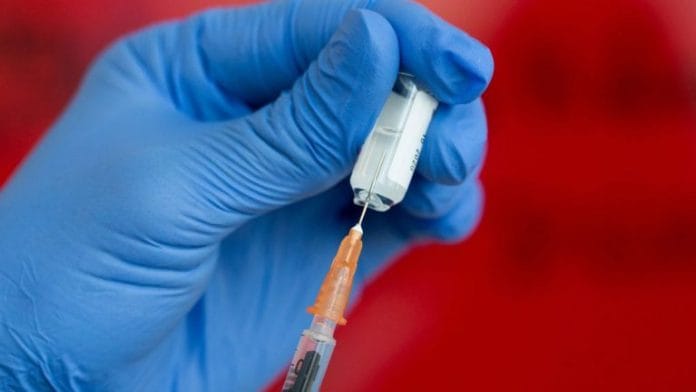New Delhi: Private hospitals could charge people Rs 400/per shot when they start Covid vaccination, but the figure may change as discussions continue, ThePrint has learnt.
According to a top official in the Union Ministry of Health & Welfare, this is the estimate presented by private hospitals to the government, after factoring in a Rs 100 charge to pay nurses’ fees and account for miscellaneous expenses. A cost of Rs 400/shot would translate to an overall charge of Rs 800 for the two-dose regimen required for the Covid vaccines currently in use.
The health ministry official shared this information as the Modi government announced its decision to involve private hospitals in the country’s mega immunisation drive for Covid-19.
Thus far, private hospitals have only served as vaccination centres, with the government procuring the vaccines. The government said Wednesday that those getting the Covid-19 shot at private hospitals would have to pay for it, while government facilities will offer the vaccine for free.
“What amount will be paid will be decided in the next three-four days after consultation with the health ministry, manufacturers, and the private hospitals,” Union Information and Broadcasting Minister Prakash Javadekar said at a press briefing, where he also announced the launch of the next phase of vaccination. Starting 1 March, the next phase will target those above 60 years and those aged above 45 years with comorbidities.
The industry is currently said to be looking at procuring Covishield, which is one of the two vaccines being administered as part of India’s immunisation drive. It has been developed by researchers at the Oxford University and the British-Swedish firm AstraZeneca, and is being manufactured in the country by the Pune-based Serum Institute of India (SII).
The second is Hyderabad-based Bharat Biotech’s Covaxin.
“We have been in discussion with the private hospitals and they have offered us that Covishield shot could be given at Rs 400. The cost of the vaccine for a buyer could be Rs 300, based on the industry’s discussion with the manufacturer of the vaccine,” the official said. “Also, they will charge Rs 100 as administration cost.”
“A Rs 100 charge is bifurcated equally — one part is the fees of a nurse and the other Rs 50 is for miscellaneous hospital expenditure,” the officer added.
However, he said “discussions are still on and evolving and this may not be the final cost that a buyer may incur”.
The cost estimate of Rs 400 was acknowledged by an industry insider who ThePrint reached for a comment, but they didn’t want to be named.
ThePrint also reached the SII spokesperson by WhatsApp with a query about the cost estimate, but they refused to comment.
Also read: India to vaccinate citizens above 60 years, comorbid patients above 45 from 1 March
‘Training module, tying with up corporates’
Speaking to ThePrint, the top health ministry official said the government has received data from the private healthcare sector to explain the role they can play in the vaccination drive.
According to the data, the official added, India has over 3,000 hospitals with more than 100 beds that have upgraded facilities — including Intensive Care Unit (ICU) — for handling adverse events that may arise after vaccination.
“These 3,000 hospitals can vaccinate 100-500 people per day. The data shows India has about 25,000 hospitals with 30-100 beds, and half of them have been offered to be used as vaccine delivery centres,” the official said.
“The industry has also suggested a training module for vaccinators in the private space similar to what has been followed in the government hospitals.”
Private healthcare industry experts, the official added, have also suggested a plan where “a big corporate house can tie up with two to three hospitals and get their staff vaccinated in a short time, on a daily basis”.
“We are reviewing all the plans and will soon come out with announcements on a concrete plan,” the official said.
Also read: Private sector can be govt’s useful ally in Covid vaccination, not an adversary
Slow vaccination
As of Wednesday, India had administered the first shot of Covid vaccines’ two-dose regimen to 1,07,67,000 people. Of these, 14 lakh have received the second dose, which is administered after a four-week gap.
In an interview to ThePrint earlier this month, Dr N.K. Arora, head of the operations research group in the Indian Council of Medical Research (ICMR) national task force for Covid-19, addressed concerns about the pace of the vaccination programme, saying it was deliberately kept low to understand the “hiccups” of the system.
The government, he added, will increase the pace of Covid vaccinations, with an aim to eventually vaccinate 70 lakh people everyday.
Also read: When will Covid end? In 7 years at today’s vaccination rates







Do they give cash receipt for the jab(s) taken ? If not, then why ?
When everything is being digitalized, why aren’t they taking online payment channels ? The PM himself is in favour of digitalization. Although, it should be optional and upto the person (s) taking the jab(s).
All manufacturing units, employing above a certain number of personnel, have a medical facility for emergency medical attention. They can be authorised to inoculate the employees. All banks have tie ups with hospitals, private practitioners etc for their employees. All IT companies have doctors on their campus. They can be utilised. Expenditure for inoculation to be allowed under healthcare/ welfare of employees. This will reduce the burden on private hospitals etc. Vaccinations to be encouraged under CSR, including sums not spent in previous years. Rs 400/- per shot in private healthcare appears to be reasonable.